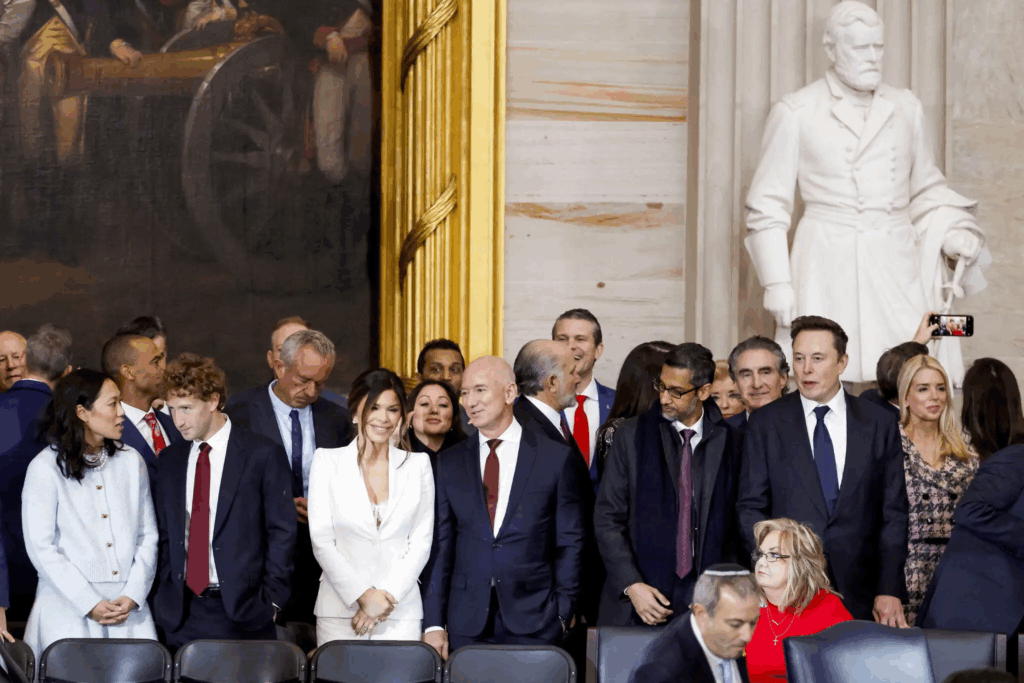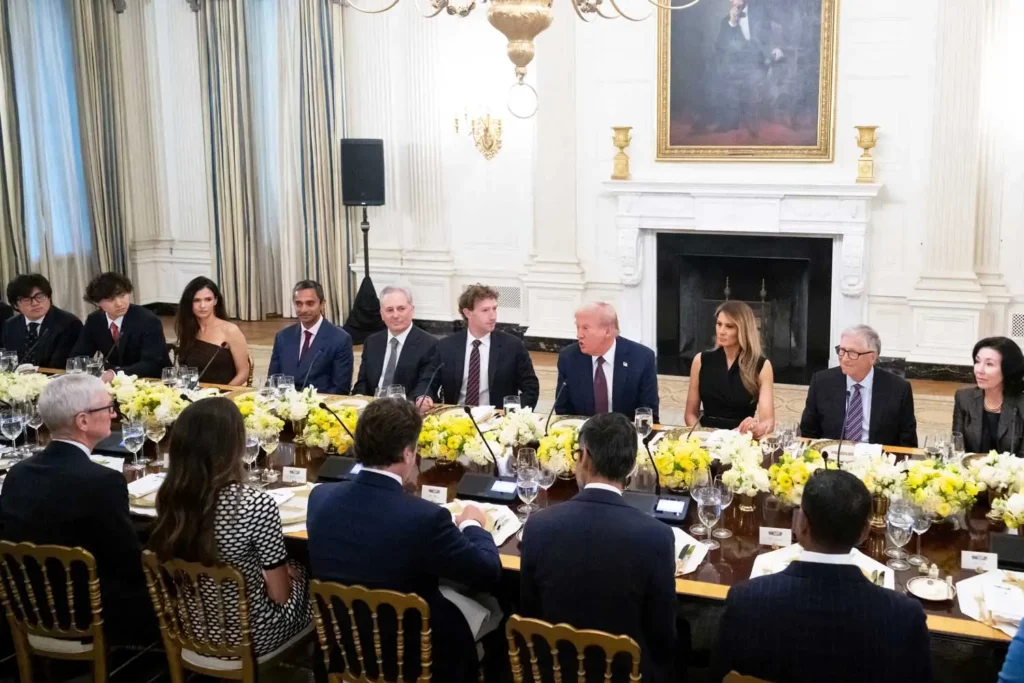Your sense of helplessness in the face of what is happening in Gaza is exactly what the criminals are counting on to complete their annihilation. They want you to believe that they are almighty and that you are worthless. They want us all to feel defeated.
So let the time for feelings, condemnation, and helplessness end.
And let the time for disruption begin, a silent disruption: Our brief withdrawal from the digital world could inflict massive financial losses on the American economy and put real pressure on Trump to stop the massacre.
This deterrence will only succeed if you join us.
When the U.S will decide it, and what can push the U.S. to take action?
Only when it is under real pressure.
And what is real pressure for the U.S.?
Money and business. That is the foundation of America’s strength.
The economy is the lifeblood of capitalism. A strong economy means more jobs, low unemployment, high purchasing power, and social stability — and that’s exactly what matters to American and Western politicians.
What about moral pressure?
America under Trump (and often beyond) does not care about:
- International charters
- Moral principles
- Political traditions
To those in power in the U.S., these are just old rules of a game that must now be rewritten according to their standards.
If under pressure, OK. And what can pressure the U.S. ?
When the U.S. wants to pressure other countries, it uses boycotts and economic sanctions.
We’ve seen this applied even to powerful nations — China, the EU, Canada… all faced partial boycotts and increased tariffs.
Why do these countries yield?
Because they want to maintain access to the American market. Without it, they suffer:
- Economic losses
- Job losses
- Public discontent
- Political instability
So economic boycotts work.
We can use the same tactic the U.S. uses:
Economic pressure — via a digital shutdown.
Economy, and what does this have to do with me ?
You may think:
“A boycott needs state power. I’m just an individual. What can I do?”
The truth is, your government is powerless in front of the U.S. right now.
Even if leaders want to please their citizens protesting for Gaza, they know that doing so publicly could cost them their positions — or plunge their nations into political turmoil.
The power imbalance is massive:
Any solo confrontation with the U.S. is futile.
It’s like trying to fight a tank battalion with a hunting rifle.
But individuals DO have power — together.
How?
By organizing a large-scale digital shutdown.
In this case, America’s opponent isn’t a single nation — it’s a scattered, anonymous group of millions of individualsacting in sync.
How does that work?
American companies — like Netflix, YouTube, Google, Facebook, WhatsApp, Instagram, Amazon, Disney — make massive profits by selling their services in North Africa and the Middle East.
What services? I don’t buy anything.
You are the product.
Have you ever asked yourself:
Who pays for all these “free” services?
These platforms employ hundreds of thousands of workers, maintain giant data centers, servers, electricity, cooling, infrastructure…
That costs billions.
And yet, you:
- Watch hours of videos on YouTube for free
- Message on WhatsApp/Instagram for free
- Sometimes even earn money using these platforms!
Sounds like a dream, doesn’t it?
But nothing is really free. Someone has to pay.
And that someone… is the advertiser.
You give your time and your data.
These platforms say you spend over 3 hours a day using their services.
That time — along with your personal data (age, gender, location, interests, language, etc.) — becomes a product they sell to advertisers.
Those advertisers bid for your attention to show you:
- A product
- A brand
- A political message
- A belief
Yes, even governments use these tools — like Russia did in the U.S. elections to manipulate public opinion.
How much money do they generate?
According to platform stats, this is how much each of them earns per user per month:
| Platform | Avg. Monthly Revenue/User (ARPU) |
|---|---|
| $13.12 | |
| $2.68 | |
| $0.36 | |
| YouTube | $11.67 |
| Netflix | $17.30 |
| Disney+ | $3.91 |
| Google Ads (Search) | $26.90 |
| Google Ads (Display) | $6.30 |
| TOTAL | $81.88 |
So without knowing it, you’re helping these platforms earn $82 per month — just by being online.
What happens if you stop using them?
They instantly lose money.
No users → No views →No ads → No revenue → Layoffs
→ Crashes → Panic
Even one user matters — and millions acting together can trigger a digital earthquake.
You are the king in capitalism.
In capitalism, the consumer is king.
If there are no consumers, the economy collapses — even if the products are amazing.
This is why digital boycott works.
But it only works if it’s collective.
If digital shutdown, and how effective could it be?
Let’s say just the users from North Africa & the Middle East (around 200 million users) log off from these platforms.
| Platform | Monthly Revenue (MENA) | Daily Loss Estimate |
|---|---|---|
| $1.36B | ||
| $493M | ||
| YouTube | $1.96B | |
| Google Search | $6.13B | |
| Total | $9.95B/month | $331.7M/day |
If just 10 million people join:
→ That’s $18.1M lost every day.
Big loss to tech giants, but how will this translate to political actions?
Who travels with the U.S. President when he visits countries?
- Politicians, yes
- But also CEOs and executives
Why? To sign business deals.
Why does the President care about private company profits?
Because a thriving economy creates jobs — which keeps voters happy.
Who funded Trump’s campaign and inauguration?

| Company | CEO | Support |
|---|---|---|
| X (Twitter) | Elon Musk | Major donor |
| Meta | Mark Zuckerberg | $1M donation |
| Amazon | Jeff Bezos | $1M + in-kind |
| Apple | Tim Cook | $1M personally |
| Sundar Pichai | Top guest | |
| TikTok | Shou Zi Chew | Attended |
| OpenAI | Sam Altman | $1M + attended |
| Uber | Dara Khosrowshahi | Attended |
These companies fund, influence, and pressure the U.S. president.
If they’re losing money, they’ll pressure the president to act.
When the shutdown starts:
- Fewer clicks
- Fewer ad sales
- Immediate panic
These platforms can’t afford to bleed billions.
The more people participate, the stronger the impact — think Black Thursday, Wall Street crash of 1929.

How can I join the shutdown campaign?
Follow the Instagram page @shutdowntoendhunger
By following, you pledge to participate when the shutdown begins.
When will the shutdown start?
Once enough participants join, the instagram page and this website will announce the shutdown date.
We target 10 million volunteers.
Then everyone logs off until the companies pressure Trump, and Trump pressures Israel.
We will be logged off from the platforms, how can we track updates?
Here in this website www.digitalshutdown.com and the news (tv, newspapers)
What do I lose by logging off?
Nothing meaningful.
- No need to protest
- No confrontations with police or state
- No leaving home
- No work interruption
It’s a silent, personal act.
No one sees you. No risk involved.
You simply stop using platforms for a short, defined time.
What do you “lose”?
Your 3 hours/day on a screen?
You actually gain time — with your family, friends, for sports, reading, or rest.
Is this campaign anti-platforms?
No. This isn’t about ideology. These platforms offer many benefits too.
But right now, they’re the most effective pressure tool we have.
Is the shutdown permanent?
No. It’s a shutdown, not a boycott.
It’s a temporary, tactical protest, until demands are met.
After that, users return to normal.
Who is behind this campaign?
An independent civilian initiative. No affiliations.
Any group is welcome to support — legally.
Otherwise, it’s a peer-to-peer citizen action.